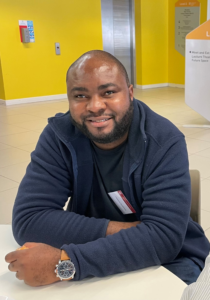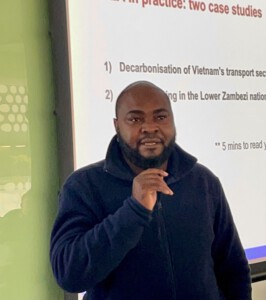Clement Sichimwa is a lecturer and researcher, with an MSc in Environmental Ecology. His research interests include Tourism, Gender, and Climate Change. Nearing completion of his PhD in Tourism Management at the University of Pretoria, South Africa, Clement is a key member of CCG’s team in Zambia, alongside Kabwe Mubanga. We caught up with him at CCG’s General Meeting in London.
Where did your interest in environmental ecology and tourism begin?
 I’ve always been interested in the environment and how the world around me works. But my decision to venture into natural resource management was basically a natural one. I did my bachelor’s degree in natural resource management at the University of Zambia and graduated top of my class.
I’ve always been interested in the environment and how the world around me works. But my decision to venture into natural resource management was basically a natural one. I did my bachelor’s degree in natural resource management at the University of Zambia and graduated top of my class.
Long before I even graduated, I was approached to become a lecturer. I normally joke that I’ve never looked for a job in my life, but it’s true. I got into what they call the staff development programme and me and my friends started a master’s programme at the University of Zambia. We were just about to do the research part of it when we were given scholarships to go to South Africa. So, I went and did my master’s in environmental ecology at the University of Pretoria.
While I was there, two departments wanted me to work with them – the geography department and the tourism department. So I made a deal to finish my master’s with the geography department and do my PhD with the tourism department. So a couple of days after graduating, I was on a flight to Finland to begin working on my PhD.
How did you become a member of the CCG Zambia team?
When CCG’s Country Partnerships Team – Lara Allen, Beth Tennyson, and Kirsty Mackinlay – came to announce that CCG were going to be working with Zambia, I happened to attend that launch workshop with my friend Kabwe Mubanga. We said “wait a minute, what these guys are talking about is something of interest. Why don’t we approach them and see how we can get involved? We had a chat with Lara, and Beth and they asked us to express an interest formally. We went back to talk to our head of department, and they agreed to support us. After talking to CCG some more it became very clear that CCG’s objectives aligned with the objectives of our department. And that’s how, in the end, we were picked as coordinators, and my department is the one that’s hosting the CCG programme within the university.
Excellent. And how is it going?
So far, so good. Zambia was the third country partner to be added to the CCG programme and when we started initially, we were doing much of our work following in the footsteps of what Kenya had already done (as CCG’s first country partner). But in the past two and a half years we’ve grown at a very fast pace, so we are almost reaching the size of the Kenya network. What has helped is that we’ve had a lot of interest from government and from other research institutions; a lot of people have been interested in the work that CCG does and it’s been very easy to convince people to get involved.
So far, we have five special interest groups (SIGs) that are active and there are three new special interest groups starting soon once the focus has been decided. In total, we are managing 12 CCG-funded projects, and the stakeholder engagement has been amazing. Our most recent Annual General Meeting had over 140 participants which just goes to show how well the CCG programme has been received in Zambia and how people are keen to work with CCG.
That’s really good news. What kind of involvement does the government have with the work that you’re doing, are they already on board?
Yes. The units within which we function as CCG are the special interest groups I mentioned. These have members who work for different institutions and government officials sit in these SIGs, so the government is directly involved in the work that we do.
When we organise workshops, we are able to ask for specific individuals who have been involved in the work previously.
Where does the focus for your work come from – is it from consultations with the government about what they want CCG to focus on?
 Yes. When CCG starts working with a country it creates a country strategy which is developed in consultation with a lot of government ministries. We consult government policy documents and use the CCG Theory of Change to create an impact statement about what we hope to achieve and the outcomes we plan to generate.
Yes. When CCG starts working with a country it creates a country strategy which is developed in consultation with a lot of government ministries. We consult government policy documents and use the CCG Theory of Change to create an impact statement about what we hope to achieve and the outcomes we plan to generate.
So, those SIGs are born out of what we call country ambitions or country priorities, set by the government.
I see. It’s good to know that you’re making progress on the agreed themes. What do you think the focus might be for the new SIGs?
Mining is very big in Zambia – not just copper but various other minerals – so we have a new Critical Minerals SIG. Our government is very passionate about this. Land Use SIG is another new and important area because it encompasses all the sectors outside of Energy and Transport and it includes agriculture which is crucial for food security and also water usage.
The third new SIG is the Climate Finance SIG as funding for our climate compatible projects is a priority for the government. So this SIG will leverage opportunities to get funds to be able to grow our economy in an appropriate way.
That’s the missing piece, isn’t it?
Exactly.
You’re familiar with the Data-to-Deal concept. What kind of role do you see that having in Zambia?
The way we’re going about doing data-to-deal is we’re using the climate finance SIG to promote that concept. We’ve already had a workshop on it where CCG’s Vivien Foster presented. That workshop included a lot of government officials, and we could see how interested they were in this concept of data-to-deal. Many of them were asking when we were going to start the training.
So we’re going to use CCG modelling tools, FINPLAN and MinFin, to equip these policymakers and government officers with all the methodologies that enable data-to-deal. The training will happen in Zambia itself with CCG experts and hopefully we’ll be able to bring in the funds Zambia needs using that concept.
That would be a brilliant outcome. Moving on to the General Meeting now, how have you found it?
It’s been very insightful and that’s the thing about CCG, there’s always something new and you learn about new ways in which the programme is becoming more and more impactful – that is really encouraging for us. I was particularly interested in the concept of demonstrator countries, and the new badge system for people within the energy modelling community. I’m just very excited about all the new developments.
One of the key things from this meeting has been the word ‘integrate’; how the different teams can work together across the different themes including research, of course. I hope we can better integrate the different parts of CCG in order to expand the programme.
On that theme, does the University of Zambia that you’re based at, have climate-related curriculum and research?
Yes. My department is the Department of Geography and Environmental Studies so the environmental part of that is about climate and both Kabwe and myself are lecturers in everything climate related. But our faculty is not the only one. We also have colleagues in the education faculty who teach environmental subjects from that perspective. So it is very relevant to our university and we find areas of synergy with colleagues in the education faculty and engineering as well.
It was particularly good, I thought, to see you and the other country representatives leading sessions to pass on your national knowledge to other CCG colleagues. How did you feel about that?
It was very encouraging. Being given that opportunity for me to express myself and actually share what my country is all about is a great honour. It’s something that I’ve really appreciated, being part of the CCG programme, because it gives us a sense of belonging.
I’m glad, thank you. You are the people who know what’s going on so your knowledge is really valuable.
